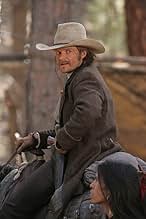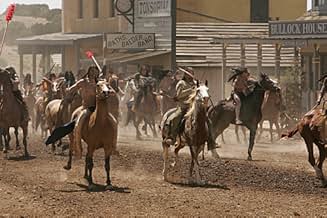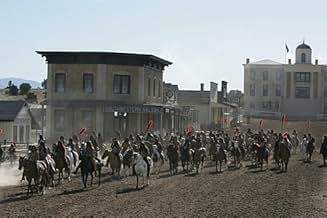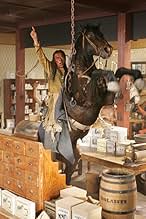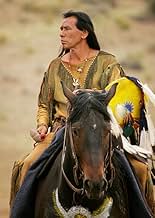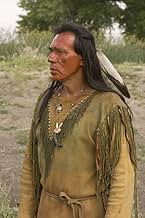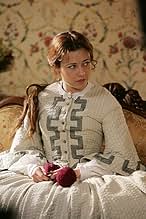अपनी भाषा में प्लॉट जोड़ेंThe adventures and love lives of young Texas Rangers Woodrow Call and Augustus McCrae leading up to their retirement to the city of Lonesome Dove.The adventures and love lives of young Texas Rangers Woodrow Call and Augustus McCrae leading up to their retirement to the city of Lonesome Dove.The adventures and love lives of young Texas Rangers Woodrow Call and Augustus McCrae leading up to their retirement to the city of Lonesome Dove.
- 5 प्राइमटाइम एमी के लिए नामांकित
- 1 जीत और कुल 13 नामांकन
एपिसोड ब्राउज़ करें
कहानी
क्या आपको पता है
- ट्रिवियाSome of the scenes were shot on Val Kilmer's ranch in New Mexico.
- गूफ़The location for the Austin set typifies the Hollywood image of Texas being dry and filled with scrub. Actually, Austin is very green and located in valley with numerous rivers, with an average humidity of only 4 millibars less than Honolulu, and has wild bamboo growing in creeks.
- भाव
Gus McCrae: [Gus says to Jake] Don't fall in with any rough necks or we'll have to hang you.
- इसके अलावा अन्य वर्जनAt the beginning of the broadcast version, there is a flashback to Buffalo Hump's youth, in which several Comanche tribes are called together to meet with American military officers in a tent, and are subsequently betrayed by the white men opening fire on them from outside. In the DVD, this scene is moved to the end of the first episode, while Buffalo Hump describes the incident to his fellow tribe members as they set out to raid Austin.
- कनेक्शनFollows Lonesome Dove (1989)
फीचर्ड रिव्यू
What shocked me about the COMANCHE MOON DVD (other than getting it for just five dollars at WalMart) was just how enjoyable and poignant it really was. As a serious reader who has read and reread all the classic LONESOME DOVE novels, I knew a lot was going to be left out and over-simplified, yet I wasn't prepared for how moved I was at the end.
First, the bad news. The Comanche side of the story is watered down and much of the impact is lost. In the book the father-son conflict between Buffalo Hump and his son Blue Duck is literally Shakespearean, with enormous intensity and passion. As the son of a Mexican woman Buffalo Hump brutally raped, Blue Duck is a symbol of tragic retribution, and the destruction he brings on Buffalo Hump is chilling and inevitable. ("The gods are just, and of our pleasant vices make means to plague us.") In the movie it just seems pointless, and random. Also in the book, Blue Duck is a symbol of change. He fights better with pistols and rifles than with the bow or the lance, and he leads an army of white drifters rather than native warriors. But in the movie these changes are glossed over, so the deeper meaning is lost.
On the other hand, the story of the Texans is told well and there are some amazing performances. Captain Scull and his sexy wife Inez are both annoying cartoon characters in the book, but Val Kilmer and Rachel Griffiths really succeed in making them not only charismatic and funny but strangely likable as well. It's interesting to note that in the book Inez Scull takes no part in any action outside of the bedroom, but in the movie she is far braver. During the Great Raid she actually joins the Rangers in fighting off the Comanches with a rifle! Normally I hate when these changes happen but here I felt it was right for the character and added a dimension of courage along with her cruelty.
Steve Zahn and Karl Urban are both terrific as Gus McCrae and Woodrow Call, but what really surprised me was how much Elizabeth Banks did as Maggie Tilton, the mother of Call's son Newt. In the books I always visualized Maggie as sort of drab and hopeless, but in the movie she's practically radiant, full of courage and good cheer no matter what the circumstances. (Whether a real prostitute on the frontier would glow like Elizabeth Banks is another question.) But it was nice to see that Maggie was more than just a victim. And some of the final scenes with Newt leaving his mother's home and saying goodbye to a young Jake Spoon were incredibly heartbreaking. These were not characters I cared about when I read the book (I was much more interested in the Comanches) but in the movie the brilliant performances really made me care.
All in all I think COMANCHE MOON the movie is really a very successful film -- if you take it on its own terms and don't compare it to the book.
First, the bad news. The Comanche side of the story is watered down and much of the impact is lost. In the book the father-son conflict between Buffalo Hump and his son Blue Duck is literally Shakespearean, with enormous intensity and passion. As the son of a Mexican woman Buffalo Hump brutally raped, Blue Duck is a symbol of tragic retribution, and the destruction he brings on Buffalo Hump is chilling and inevitable. ("The gods are just, and of our pleasant vices make means to plague us.") In the movie it just seems pointless, and random. Also in the book, Blue Duck is a symbol of change. He fights better with pistols and rifles than with the bow or the lance, and he leads an army of white drifters rather than native warriors. But in the movie these changes are glossed over, so the deeper meaning is lost.
On the other hand, the story of the Texans is told well and there are some amazing performances. Captain Scull and his sexy wife Inez are both annoying cartoon characters in the book, but Val Kilmer and Rachel Griffiths really succeed in making them not only charismatic and funny but strangely likable as well. It's interesting to note that in the book Inez Scull takes no part in any action outside of the bedroom, but in the movie she is far braver. During the Great Raid she actually joins the Rangers in fighting off the Comanches with a rifle! Normally I hate when these changes happen but here I felt it was right for the character and added a dimension of courage along with her cruelty.
Steve Zahn and Karl Urban are both terrific as Gus McCrae and Woodrow Call, but what really surprised me was how much Elizabeth Banks did as Maggie Tilton, the mother of Call's son Newt. In the books I always visualized Maggie as sort of drab and hopeless, but in the movie she's practically radiant, full of courage and good cheer no matter what the circumstances. (Whether a real prostitute on the frontier would glow like Elizabeth Banks is another question.) But it was nice to see that Maggie was more than just a victim. And some of the final scenes with Newt leaving his mother's home and saying goodbye to a young Jake Spoon were incredibly heartbreaking. These were not characters I cared about when I read the book (I was much more interested in the Comanches) but in the movie the brilliant performances really made me care.
All in all I think COMANCHE MOON the movie is really a very successful film -- if you take it on its own terms and don't compare it to the book.
- Dan1863Sickles
- 8 मई 2011
- परमालिंक
टॉप पसंद
रेटिंग देने के लिए साइन-इन करें और वैयक्तिकृत सुझावों के लिए वॉचलिस्ट करें
विवरण
- रिलीज़ की तारीख़
- कंट्री ऑफ़ ओरिजिन
- आधिकारिक साइटें
- भाषाएं
- इस रूप में भी जाना जाता है
- Луна команчей
- फ़िल्माने की जगहें
- उत्पादन कंपनियां
- IMDbPro पर और कंपनी क्रेडिट देखें
इस पेज में योगदान दें
किसी बदलाव का सुझाव दें या अनुपलब्ध कॉन्टेंट जोड़ें




